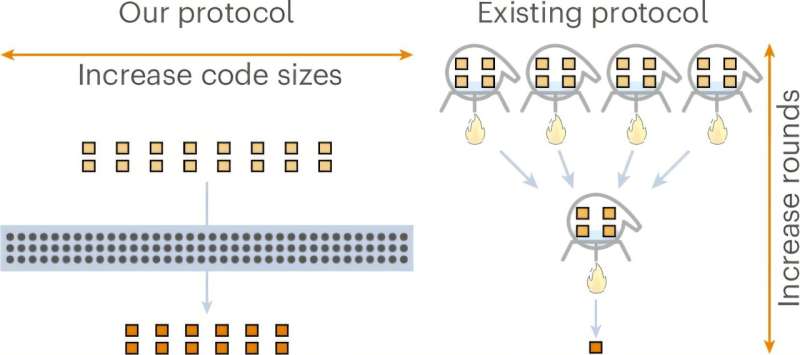Science
Researchers Achieve Breakthrough in Quantum Magic State Distillation

Researchers have successfully demonstrated the theoretically optimal scaling for magic state distillation, a crucial advancement in the quest for fault-tolerant quantum computing. This breakthrough addresses a longstanding challenge in the field by achieving a scaling exponent of exactly zero, surpassing previous efforts. The findings were published in the journal Nature Physics on November 12, 2025.
The lead author of the study, Adam Wills, a Ph.D. student at the Massachusetts Institute of Technology (MIT), emphasized the significance of this achievement. “Building quantum computers is a wonderful and inspiring goal,” Wills stated. “However, it is an extremely challenging goal. Most of the reason we don’t have quantum computers already is the issue of noise.” Qubits, the fundamental units of quantum information, are fragile and susceptible to environmental interference, necessitating robust error-correcting codes for protection.
Despite error correction, existing codes primarily support Clifford gates, which do not provide a quantum advantage independently. The implementation of non-Clifford operations in a fault-tolerant manner has presented a significant bottleneck in the development of quantum computing. Magic state distillation, introduced by Bravyi and Kitaev in 2005, offers a solution by enabling these operations through specially prepared quantum states. Nonetheless, the process has traditionally been resource-intensive, with the overhead—the ratio of noisy input states required for high-quality output states—increasing as error rates decrease.
Revolutionizing Quantum Efficiency
Magic states, as defined by Bravyi and Kitaev, represent a quantifiable resource necessary for universal quantum computation. These states exist outside the stabilizer state zone where classical computers operate and provide enhanced contextuality, granting quantum computers their competitive edge. For instance, executing a T gate requires consuming one magic state alongside Clifford operations and measurements. Currently, the production of noisy magic states suffers from relatively high error rates, typically around 10^-3, while quantum advantage necessitates a reduction to approximately 10^-7, and for large-scale algorithms, rates as low as 10^-15.
The team focused on optimizing magic state distillation, measuring its efficiency through overhead. For decades, as the target error rate decreased, this overhead increased, characterized by a scaling exponent denoted as γ (gamma). Achieving γ = 0 indicates constant overhead, independent of the purity of the final states. Notably, previous attempts had achieved γ ≈ 0.678, while later efforts approached γ = 0 but required impractically large quantum systems. Wills and his colleagues successfully proved that γ = 0 is achievable in practical qubit systems.
“We demonstrate that constant-overhead magic state distillation is possible,” Wills explained. “If you had a quantum computer that was large enough, accurate enough, and running a long enough algorithm, our methods would be the best way to distill magic.”
The Path to Discovery
The breakthrough emerged in two significant stages, according to Wills. The first realization involved the applicability of algebraic geometry codes, which have robust error-correcting properties suitable for fixed-size quantum systems. Previous methodologies employed different types of classical error-correcting codes, such as Reed-Muller and Reed-Solomon codes, but could not achieve the desired scaling.
Wills noted, “The second discovery came from reading a textbook from Dan Gottesman, which is still a work in progress. By going through a relatively obscure chapter, we found that we could realize our qudits as sets of qubits.” This allowed the team to translate their findings for 1024-dimensional qudits into practical applications for qubits, converting 10-qubit magic states into standard single-qubit and three-qubit magic states with minimal overhead loss.
The implications of this research establish a fundamental theoretical limit for magic state distillation overhead. While the theoretical framework supporting γ = 0 is groundbreaking, Wills cautioned about the challenges of practical implementation. “While this scaling is theoretically optimal, implementing the protocol may require significantly more physical qubits than near-term quantum computers can currently provide,” he stated.
The establishment of a solid theoretical foundation is critical for advancing fault-tolerant quantum computing. “Developing a solid theory of quantum magic is incredibly important for pushing fault-tolerance further in all regimes,” Wills added. “It is essential for universal quantum computation.”
Looking ahead, the research team plans to explore various extensions, including Wills’s recent work on transversally addressable gates, as well as optimizing constant factors, investigating quantum Low-Density Parity-Check (LDPC) code variants, and identifying the most effective conversions from qudit to qubit systems.
This significant achievement marks a pivotal moment in the ongoing journey toward practical quantum computing, with the potential to revolutionize the field and enhance our understanding of quantum mechanics.
-

 Science4 weeks ago
Science4 weeks agoIROS 2025 to Showcase Cutting-Edge Robotics Innovations in China
-

 Lifestyle4 weeks ago
Lifestyle4 weeks agoStone Island’s Logo Worn by Extremists Sparks Brand Dilemma
-

 Health4 weeks ago
Health4 weeks agoStartup Liberate Bio Secures $31 Million for Next-Gen Therapies
-

 World4 weeks ago
World4 weeks agoBravo Company Veterans Honored with Bronze Medals After 56 Years
-

 Politics4 weeks ago
Politics4 weeks agoJudge Considers Dismissal of Chelsea Housing Case Citing AI Flaws
-

 Health4 weeks ago
Health4 weeks agoTop Hyaluronic Acid Serums for Radiant Skin in 2025
-

 Lifestyle4 weeks ago
Lifestyle4 weeks agoMary Morgan Jackson Crowned Little Miss National Peanut Festival 2025
-

 Science4 weeks ago
Science4 weeks agoArizona State University Transforms Programming Education Approach
-

 Top Stories4 weeks ago
Top Stories4 weeks agoIndonesia Suspends 27,000 Bank Accounts in Online Gambling Crackdown
-

 Sports4 weeks ago
Sports4 weeks agoMel Kiper Jr. Reveals Top 25 Prospects for 2026 NFL Draft
-

 World4 weeks ago
World4 weeks agoHoneywell Predicts Record Demand for Business Jets Over Next Decade
-

 Sports4 weeks ago
Sports4 weeks agoYamamoto’s Mastery Leads Dodgers to 5-1 Victory in NLCS Game 2









